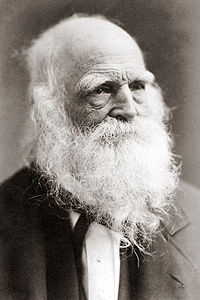The Antiquity Of Freedom
Here are old trees, tall oaks and gnarled pines,
That stream with gray-green mosses; here the ground
Was never trenched by spade, and flowers spring up
Unsown, and die ungathered. It is sweet
To linger here, among the flitting birds
And leaping squirrels, wandering brooks, and winds
That shake the leaves, and scatter, as they pass,
A fragrance from the cedars, thickly set
With pale blue berries. In these peaceful shades--
Peaceful, unpruned, immeasurably old--
My thoughts go up the long dim path of years,
Back to the earliest days of liberty.
Oh FREEDOM! thou art not, as poets dream,
A fair young girl, with light and delicate limbs,
And wavy tresses gushing from the cap
With which the Roman master crowned his slave
When he took off the gyves. A bearded man,
Armed to the teeth, art thou; one mailed hand
Grasps the broad shield, and one the sword; thy brow,
Glorious in beauty though it be, is scarred
With tokens of old wars; thy massive limbs
Are strong with struggling. Power at thee has launched
His bolts, and with his lightnings smitten thee;
They could not quench the life thou hast from heaven.
Merciless power has dug thy dungeon deep,
And his swart armorers, by a thousand fires,
Have forged thy chain; yet, while he deems thee bound,
The links are shivered, and the prison walls
Fall outward; terribly thou springest forth,
As springs the flame above a burning pile,
And shoutest to the nations, who return
Thy shoutings, while the pale oppressor flies.
Thy birthright was not given by human hands:
Thou wert twin-born with man. In pleasant fields,
While yet our race was few, thou sat'st with him,
To tend the quiet flock and watch the stars,
And teach the reed to utter simple airs.
Thou by his side, amid the tangled wood,
Didst war upon the panther and the wolf,
His only foes; and thou with him didst draw
The earliest furrows on the mountain side,
Soft with the deluge. Tyranny himself,
Thy enemy, although of reverend look,
Hoary with many years, and far obeyed,
Is later born than thou; and as he meets
The grave defiance of thine elder eye,
The usurper trembles in his fastnesses.
Thou shalt wax stronger with the lapse of years,
But he shall fade into a feebler age;
Feebler, yet subtler. He shall weave his snares,
And spring them on thy careless steps, and clap
His withered hands, and from their ambush call
His hordes to fall upon thee. He shall send
Quaint maskers, wearing fair and gallant forms,
To catch thy gaze, and uttering graceful words
To charm thy ear; while his sly imps, by stealth,
Twine round thee threads of steel, light thread on thread
That grow to fetters; or bind down thy arms
With chains concealed in chaplets. Oh! not yet
Mayst thou unbrace thy corslet, nor lay by
Thy sword; nor yet, O Freedom! close thy lids
In slumber; for thine enemy never sleeps,
And thou must watch and combat till the day
Of the new earth and heaven. But wouldst thou rest
Awhile from tumult and the frauds of men,
These old and friendly solitudes invite
Thy visit. They, while yet the forest trees
Were young upon the unviolated earth,
And yet the moss-stains on the rock were new,
Beheld thy glorious childhood, and rejoiced.
Font size:
Submitted on May 13, 2011
Modified on March 05, 2023
- 2:49 min read
- 135 Views
Quick analysis:
| Scheme | ABXXCXXDXXEF XGHXXXXXGXFXXXBXXXXX XXXXIXXXXXXXXJA EXIHXXXCXXXDJXXXXXXXXXX |
|---|---|
| Closest metre | Iambic pentameter |
| Characters | 3,099 |
| Words | 563 |
| Stanzas | 4 |
| Stanza Lengths | 12, 20, 15, 23 |
Translation
Find a translation for this poem in other languages:
Select another language:
- - Select -
- 简体中文 (Chinese - Simplified)
- 繁體中文 (Chinese - Traditional)
- Español (Spanish)
- Esperanto (Esperanto)
- 日本語 (Japanese)
- Português (Portuguese)
- Deutsch (German)
- العربية (Arabic)
- Français (French)
- Русский (Russian)
- ಕನ್ನಡ (Kannada)
- 한국어 (Korean)
- עברית (Hebrew)
- Gaeilge (Irish)
- Українська (Ukrainian)
- اردو (Urdu)
- Magyar (Hungarian)
- मानक हिन्दी (Hindi)
- Indonesia (Indonesian)
- Italiano (Italian)
- தமிழ் (Tamil)
- Türkçe (Turkish)
- తెలుగు (Telugu)
- ภาษาไทย (Thai)
- Tiếng Việt (Vietnamese)
- Čeština (Czech)
- Polski (Polish)
- Bahasa Indonesia (Indonesian)
- Românește (Romanian)
- Nederlands (Dutch)
- Ελληνικά (Greek)
- Latinum (Latin)
- Svenska (Swedish)
- Dansk (Danish)
- Suomi (Finnish)
- فارسی (Persian)
- ייִדיש (Yiddish)
- հայերեն (Armenian)
- Norsk (Norwegian)
- English (English)
Citation
Use the citation below to add this poem to your bibliography:
Style:MLAChicagoAPA
"The Antiquity Of Freedom" Poetry.com. STANDS4 LLC, 2024. Web. 26 Apr. 2024. <https://www.poetry.com/poem/40328/the-antiquity-of-freedom>.



Discuss the poem The Antiquity Of Freedom with the community...
Report Comment
We're doing our best to make sure our content is useful, accurate and safe.
If by any chance you spot an inappropriate comment while navigating through our website please use this form to let us know, and we'll take care of it shortly.
Attachment
You need to be logged in to favorite.
Log In